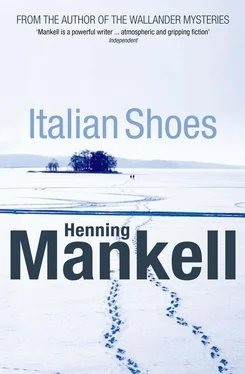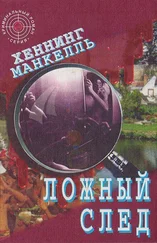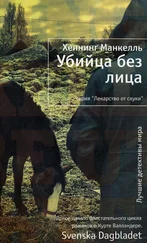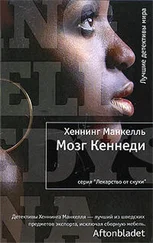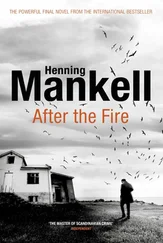All the time the forest seemed to be creeping up on the caravan.
The coffee was strong, my hangover painful. I took my cup of coffee out into the fresh air. A cloud of damp mist hovered over the forest. A rifle shot echoed in the distance. I held my breath. It was followed by a second one, then nothing more. It seemed that all sounds were having to queue up before being allowed into the silence — and then only tentatively, one at a time.
I went back inside and started searching methodically through the caravan. Although it was small and cramped, there was a surprising amount of storage space. Louise kept everything in good order. Her favourite colour for clothes seemed to be chestnut brown, although some items were a shade of deep red. Most garments were in earth colours.
In a simple wooden chest with the year 1822 painted on the lid, I was amazed to find a large sum of money — thousand-kronor and five-hundred-kronor notes amounting to 47,500 in all. Then I began investigating drawers containing documents and letters.
The first item I found was a signed photograph of Erich Honecker. It said on the back that it dated from 1986, and had been sent by the DDR Embassy in Stockholm. There were several more photographs in the drawer, all of them signed — Gorbachev, Ronald Reagan and Africans I had never heard of, but presumed were statesmen. There was also a photograph of an Australian prime minister whose name I couldn’t make out.
I moved on to the second drawer, which was full of letters. After having read five of them, I began to understand how my daughter spent her time. She wrote letters to political leaders in all parts of the world, protesting about the way in which they were treating their own citizens and also people in other countries. In every envelope was a copy of the letter she had written in her sprawling hand, and the reply she had received. She had written to Erich Honecker in passionate English to the effect that the Berlin Wall was a disgraceful scandal. In reply she had received a photograph of Honecker on a podium waving to a blurred mass of East Germans. Louise had written to Margaret Thatcher urging her to treat the striking miners decently. I couldn’t find a reply from the Iron Lady — in any case there was nothing in the envelope apart from a photograph of Thatcher clutching her handbag tightly. But where had Louise got all that money from? There was no clue here to answer that question.
That was as far as I got. I heard the sound of a car approaching, closed the drawers and went outside. Louise was driving fast. She braked abruptly in the wet snow.
Louise took the walker out of the boot.
‘We didn’t want to wake you up. I’m delighted to discover that my father is an expert in the art of snoring.’
She helped Harriet out of the car.
‘We’ve been shopping,’ said Harriet with a smile. ‘I’ve bought some stockings, a skirt and a hat.’
Louise lifted some carrier bags from the back seat.
‘My mother never did have any dress sense,’ she said.
I carried the bags to the caravan while Louise helped Harriet to negotiate the slippery slope.
‘We’ve eaten already,’ said Louise. ‘Are you hungry?’
I was in fact, but shook my head. I didn’t like her borrowing my car without permission.
Harriet lay down on the bed to rest. I could see that the trip had done her good, but had exhausted her even so. She soon fell asleep. Louise produced the red hat that Harriet had bought.
‘It suits her,’ she said. ‘It’s a hat that could have been made specific ally for her.’
‘I’ve never seen her wearing a hat. When we were young, we were always bare-headed. Even when it was cold.’
Louise put the hat back in its bag, and looked round the caravan. Had I left any traces? Would she see that I’d spent the time they were away going through her belongings? She turned to look at me, then at my shoes that were standing on a newspaper next to the door. I’d had them for many years. They were very worn, and several of the lace-holes had split. She stood up, gently placed a blanket over her mother, and put on her jacket.
‘Let’s go out,’ she said.
I was only too pleased to do so. My headache was painful.
We stood outside the caravan, breathing in the bracing air. It struck me that I had failed to write anything in my logbook for several days now. I don’t like breaking my routine.
‘Your car could do with a service,’ said Louise. ‘The brakes are out of balance.’
‘It’s good enough for me. Where are we going?’
‘We’re going to see a good friend of mine. I want to give you a present.’
I turned the car round in the slush. When we came to the main road, she told me to turn left. Several lorries laden with logs whipped up clouds of snow. After a couple of miles she told me to turn right: a sign indicated that we were heading for somewhere called Motjärvsbyn. The pine trees came to the very edge of the road, which was badly ploughed. Louise was concentrating on the road ahead. She was humming a tune: I recognised it, but couldn’t remember what it was called.
We came to a fork, and Louise pointed to the left. After half a mile or so the forest receded and the road was lined with a row of cottages: but they were empty, dead, no smoke rose from their chimneys. Only the cottage at the end of the row, a two-storey wooden building with a battered, green-painted porch, showed any signs of life. A cat was sitting on the steps. A thin wisp of smoke rose up from the chimney.
‘Via Salandra in Rome,’ said Louise. ‘That’s a street I’m determined to walk along one of these days. Have you ever been to Rome?’
‘I’ve been there several times. But I don’t know the street you mention.’
Louise got out of the car. I followed her. The timber-built cottage must have been over a hundred years old; opera music could be heard from inside.
‘There’s a genius living in this house,’ said Louise. ‘Giaconelli Mateotti. He’s an old man now. But he used to work for the famous shoemaking family Gatto. As a young apprentice, he was taught his trade by the one and only Angelo Gatto, who started his workshop at the beginning of the 1900s. But now Giaconelli has brought his skills to the forest. He grew tired of all the traffic, of all the important customers who were always so impatient and refused to accept the fact that patience and time were essential for the making of good shoes.’
Louise looked me in the eye, and smiled.
‘I want to give you a present,’ she said. ‘I want Giaconelli to make you a pair of shoes. The ones you are wearing are an insult to your feet. Giaconelli has told me how our feet our constructed; the bones and muscles that enable us to walk and run, to stand on tiptoe, to dance ballet even. I know of opera singers who don’t much care about directors or conductors or costumes or the high notes they have to sing — but are passionate about the shoes they wear which they believe enable them to sing properly.’
I stared at her. This was just like listening to my father. The browbeaten waiter who had long since been banished to the grave. He had also spoken about opera singers and their shoes.
It was a strange feeling, realising that my father and my daughter had this in common.
But the shoes she was offering me? I wanted to object, but she raised her hand, walked up the steps, pushed the cat to one side and opened the front door. The opera music hit us with full force. It was coming from one of the rooms further back in the house. We passed through the rooms that Mateotti lived in, and where he kept his leather and his lasts. On one of the walls was a hand-painted motto that I assumed had been written by Mateotti himself. Somebody by the name of Chuang Chou had said: ‘When the shoe fits, you don’t think about the foot.’
Читать дальше
